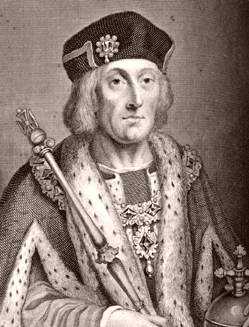Henry VII
During the reign of Henry VII (1485-1509) there was a marked increase in political stability. Henry dealt successfully and ruthlessly with all military challenges to his authority--beginning with his successful defeat of Richard III in 1485, bringing to a close* the Wars of the Roses.
He was a consummate politician, thwarting conspiracies and eliminating threats to the throne. By making use of a network of spies, Henry was aware of potential problems within his country and was able to crush opponents before they became a threat.
Centralized power
Henry VII was the first of the Tudors, with a claim to the throne that was both indirect and shaky (see the family tree). But he was less threatened by powerful rivals than previous monarchs because the numbers of the nobility had been decimated by the debilitating civil war he brought to an end. By limiting marriages between nobles and wealthy heiresses, and by controlling patronage, Henry was indirectly able to prevent any new threats from developing.
He kept a strong grip on power by extending the authority of the Crown and streamlining government. In the twenty-four years of his reign, Parliament was called only seven times.
Internationally, England, for the first time in over one hundred years, was at peace. The 100 Years War with France had ended (with England's loss of all its territories except Calais), and Henry VII was responsible for treaties with Aragon in 1489 and Castile in 1496 (parts of modern Spain). He also managed to maintain peace with the Scots.
One way that Henry consolidated power was by rewriting history in such a way that his reign could be justified. The result is often called the Tudor Myth.
Footnotes
-
The conflict ends . . .
Shakespeare records the beginning of the wars in Henry VI, Part Two (5.2), and their end in the famous lines of Richard III: "A horse! A horse! My kingdom for a horse!" (5.5.13), after which follows this graphic stage direction:
Alarum [sounds of battle]. Enter RICHARD and RICHMOND [later Henry VII]; they fight; RICHARD is slain. Retreat and flourish [trumpet calls]. Enter RICHMOND, and the Earl of Derby, bearing the crown, with divers other lords.
Thus ended the Wars of the Roses.
